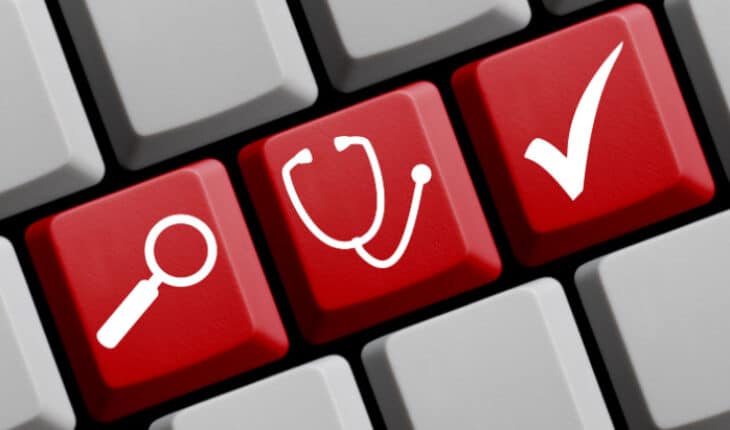Dr Google Will See You Now: Over two thirds of UK patients seek medical advice online due to long delays to see specialists
More than two thirds of UK patients who are waiting to see a specialist or receive treatment (69%) are turning to the internet for medical advice – potentially putting themselves at risk of worsening their condition(s).
The main reasons people are Googling their symptoms or condition are to get some ‘reassurance’ (49%), to self-medicate while they await treatment or diagnosis (40%), or because they felt ‘powerless’ (22%).
One in ten even said they’d done this because they didn’t think they’d received the right diagnosis from their GP (10%).
This is according to new research from the medical negligence experts at law firm Been Let Down.
There are currently 7.3m people waiting for NHS treatment in England – up by nearly 3m since the start of the pandemic, and the latest NHS satisfaction report shows that many patients are particularly unhappy with the GP service they are receiving, with long waiting times for appointments cited as the main cause of frustration.
This was also reflected in the Been Let Down study, where over one in six (16%) recent GP patients (last six months) said they were left feeling dissatisfied by the outcome of their appointment.
Nearly half of those who were unhappy said they didn’t feel their symptoms were taken seriously (48%) or their GP hadn’t taken the time to understand their health concern (45%).
NHS England data shows that over a third of appointments (35%) currently last for 10 minutes or less, and 16% last five minutes or less* potentially making it challenging for GPs to consistently provide the right diagnosis or make the necessary referral recommendation.
Patients are most likely to have an appointment that lasts five minutes or less in…
- Suffolk and North East Essex (20%)
- Humber and North Yorkshire (20%)
- West Yorkshire (20%)
- Leicester, Leicestershire and Rutland (19%)
- Lincolnshire (19%)
One in five (21%) frustrated patients also felt the mode of their appointment (i.e., telephone) was not appropriate.
Around seven in ten appointments (70%) are now face to face* – and this has been increasing since November. That said, millions of appointments a month are still happening online or via the phone.
Patients are most likely to have a video or telephone appointment in*…
- Buckinghamshire, Oxfordshire and Berkshire West (40%)
- Frimley in Surrey (40%)
- Cheshire and Merseyside (40%)
- South East London (36%)
- Herefordshire and Worcestershire (35%)
Overall, NHS figures show the demand for appointments with GPs continues to rise, putting additional pressure on already-stretched services. There were nearly two million more appointments this March (31.4 million) than last March (29.6 million).
Perhaps because of this higher demand, slightly fewer people are being seen on the same day too – around 43% are being seen on the same day this year, versus 45% last year and 46% 2021.
Worryingly, around 3% of people are waiting over 28 days / four weeks to be seen by their GP, and in some areas, this is significantly higher.
Patients are most likely to face a wait of over four weeks in…
- South Yorkshire (8%)
- Gloucestershire (8%)
- Derby and Derbyshire (8%)
- North East and North Cumbria (7%)
- Sussex (7%)
Helen Neville, Solicitor and Deputy Head of Clinical Negligence (Liverpool) at Been Let Down, said: “The latest survey on NHS satisfaction showed that overall satisfaction has fallen to its lowest level since the study began in 1983, with more than half (51%) of respondents reporting their dissatisfaction with the NHS.
The main reason people gave for being dissatisfied was waiting times for GP appointments (69%), and satisfaction with GP services specifically is at 35% – again, this is the lowest level recorded since the survey began.
Recently (9 May), the Prime Minister unveiled plans to “transform” primary care by giving pharmacists in England the power to write prescriptions for some common conditions including earache, sore throat, urinary tract infections, infected insect bites, impetigo, shingles and sinusitis without needing the approval of a GP. The measure could be rolled out across England as soon as this winter.
Self-referrals are also set to be increased for services including physiotherapy, hearing tests and podiatry, bypassing the need to see a GP.
While NHS chief executive Amanda Pritchard said the reforms would “help to free up millions of appointments for those who need them most” we are concerned that this shortcut could mean that some people don’t receive the care they need and are potentially misdiagnosed.
It’s clear that the NHS is under enormous pressure and change is needed, but the role of our GPS is still essential. For many patients, it is the gateway to receiving specialist care to treat their condition.
Similarly, reducing appointment duration and conducting these via the phone means that GPs are often being put in a situation whereby their ability to adequately understand a patient’s concerns and appropriately determine the right next step is being compromised.
This is not fair on them or their patients. Medical professionals have a duty of care towards their patients and if this is compromised, it can have a devastating effect. In some cases where a patient is misdiagnosed or has a delayed or denied referral this can result in financial loss, physical and emotional harm and have a knock-on effect on their families.
A system where GPs are supported in their work is essential to reduce the risk of this happening. The primary care system is in desperate need of funding and support; opening up pharmacists to an increase in patients and enquiries when some places in the country do not have access to pharmacies is not a well thought through plan.”
An NHS spokesman was contacted for a comment in response to the research and said: “GPs and their teams are delivering millions more appointments than before the pandemic, including more on the same or next day, and the latest survey of more than half a million patients shows that the vast majority have a good experience, with more than four in five people saying they had sufficient time, were listened to, and had confidence in how they were treated.
“More than 29,000 additional staff have been recruited to GP teams to bolster patient care since 2019 and our new GP access recovery plan sets out how even more patients will receive quicker and convenient access to NHS care – so as ever, please come forward if you have a health concern.”
A Department of Health and Social spokesman, also for the NHS, added: “There are more doctors, nurses and staff than ever before working in the NHS, with more than 500 more doctors working in general practice when compared to the same time last year.
“There were also two million more GP appointments in March 2023 compared to March 2022, that’s 83,500 more per working day, which is 10% higher than pre-pandemic.
“And we recently announced £240million of support to GP practices across the UK this year to embrace the latest technology and make it easier for patients to see their GP.”
If you’re looking for more information, please visit this page:
- Gut microbiome could delay onset of type 1 diabetes - 3rd April 2025
- The da Vinci 5 Robot Is Set To Transform Bariatric Care: - 31st March 2025
- Beyond money: the hidden drivers fuelling child food insecurity - 31st March 2025






